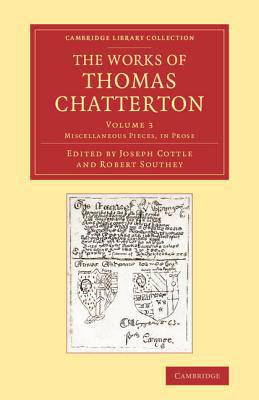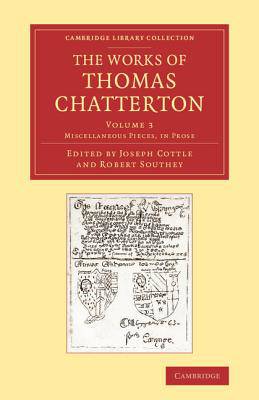
- Afhalen na 1 uur in een winkel met voorraad
- Gratis thuislevering in België vanaf € 30
- Ruim aanbod met 7 miljoen producten
- Afhalen na 1 uur in een winkel met voorraad
- Gratis thuislevering in België vanaf € 30
- Ruim aanbod met 7 miljoen producten
Zoeken
Omschrijving
Thomas Chatterton (1752-70) was only seventeen when he died of arsenic poisoning. Among his family and friends he was known as a versifier with a fascination for medieval manuscripts, but none suspected the true scope of his work. At eleven, he was already writing poetry, and by the end of his life his love poems, eclogues and forged medieval pieces numbered in the hundreds. Chatterton is best known for the Rowley poems, which he claimed were transcribed from the work of a fifteenth-century monk. Although the precocious skill of his forgeries, once exposed, often went unrecognised by critics, Chatterton's legacy influenced the Romantics for decades after his death. This three-volume collection of his work, edited by Joseph Cottle and Robert Southey, first appeared in 1803. Volume 3 includes Chatterton's prose works, selected letters, some contemporary discussion of his work, and Cottle's account of the Rowley manuscripts.
Specificaties
Betrokkenen
- Auteur(s):
- Uitgeverij:
Inhoud
- Aantal bladzijden:
- 556
- Taal:
- Engels
- Reeks:
Eigenschappen
- Productcode (EAN):
- 9781108063395
- Verschijningsdatum:
- 26/09/2013
- Uitvoering:
- Paperback
- Formaat:
- Trade paperback (VS)
- Afmetingen:
- 140 mm x 216 mm
- Gewicht:
- 698 g

Alleen bij Standaard Boekhandel
+ 203 punten op je klantenkaart van Standaard Boekhandel
Beoordelingen
We publiceren alleen reviews die voldoen aan de voorwaarden voor reviews. Bekijk onze voorwaarden voor reviews.








